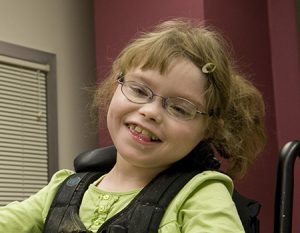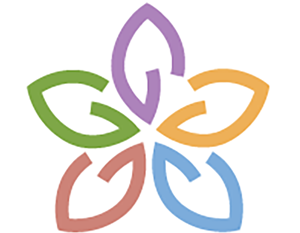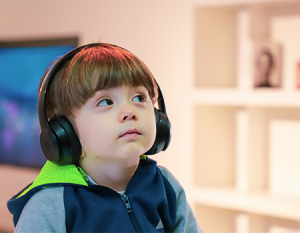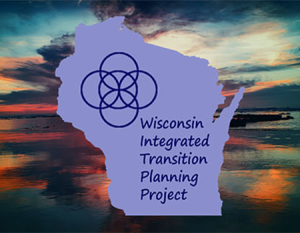This is an accordion element with a series of buttons that open and close related content panels.
Augmentative and Alternative Communication (AAC) Program
Augmentative and Alternative Communication (AAC) Program
 The AAC Program impacts individuals across the lifespan who are experiencing significant communication difficulties. This program provides the infrastructure needed to test new approaches to practice as well as providing a model direct service for training future and current professionals. It includes all four UCEDD core functions (service, training, research and information dissemination) in its program design. The AAC program includes the AAC-Partnership, Communication Aids & Systems Clinic (CASC), Communications Development Program (CDP), and ECHO-AAC.
The AAC Program impacts individuals across the lifespan who are experiencing significant communication difficulties. This program provides the infrastructure needed to test new approaches to practice as well as providing a model direct service for training future and current professionals. It includes all four UCEDD core functions (service, training, research and information dissemination) in its program design. The AAC program includes the AAC-Partnership, Communication Aids & Systems Clinic (CASC), Communications Development Program (CDP), and ECHO-AAC.
- AAC Clinic
Communication Aids & Systems Clinic (CASC) - AAC Education
ECHO-AAC - AAC Outreach Services
Augmentative and Alternative Communication (AAC) Partnership Program
Communication Development Program (CDP)
Contact:
Jennifer Seale, PhD, CCC-SLP
Email: jseale@wisc.edu
Website: Augmentative and Alternative Communication (AAC) Program
Children's Resource Center - South (CRCS)
Children’s Resource Center-South

The Southern Regional Center for CYSHCN, funded by the State Maternal Child Health block grant, benefits families with CYSHCN and the providers who support them through providing information, referral and follow up services; promoting a parent-to-parent support network and family leadership development; and increasing local capacity of community-based systems of support.
Contact:
Meredith Vitaioli, CRC Director
(608) 263-2004
meredith.vitaioli@wisc.edu
Tim Markle – Outreach & Training Manager
(608) 262-8033
Email: tmarkle@wisc.edu
Website: Children’s Resource Center-South
Community Training
Community Training

Community Training provides practical trainings to caregivers, provider agencies, families, individuals with disabilities, program administrators/supervisors, and community members interested in learning more about related topics in the field of Intellectual/ Developmental Disabilities. Many trainings are developed and presented by COW staff who have extensive experience and knowledge in supporting people with disabilities to promote full community inclusion.
Contact:
Michael Truman
608- 516-8410
Email: mltruman@wisc.edu
Website: Community Training
Genetics Systems Integration Hub-Wisconsin
Genetics Systems Integration Hub-Wisconsin

This project provides a central source for the exchange of information and resources related to maternal child health (MCH) genetics services and programs in WI, maintains the Genetics in Wisconsin website, and facilitates the delivery and evaluation of genetics education for healthcare providers in Wisconsin.
Contact:
Sara Zoran, MS
(608) 262-0182
Email: zoran@wisc.edu
Website: Genetics in Wisconsin
Health Transition Wisconsin
Health Transition Wisconsin

The Youth Health Transition Initiative provides Wisconsin’s youth, family members, providers, and other community collaborators with information on the movement from the pediatric world to adult health care. Tools, materials, and resources are available to help teens, families, and health care systems in the health care transition process.
Contact:
Tim Markle
(608) 262-8033
Email: tmarkle@wisc.edu
Website: Health Transition Wisconsin
Wisconsin Care Integration Initiative
Wisconsin Care Integration Initiative

The Wisconsin Care Integration Initiative (WiCII) project aims to increase family-centered, integrated systems of care for children with autism spectrum disorders (ASD) and other developmental disabilities (DD), with a focus on medically underserved areas and populations. WiCII is partnering with primary care practices to provide family navigation services to medically underserved families of children with/at risk for ASD/DD; increase provider knowledge and skill related to early identification, referral, and supporting families to access services; and increase access statewide to culturally and linguistically competent educational resources to improve family self-efficacy in navigating systems of care. To build provider capacity for early identification, referrals, and care in local communities, WiCII supports a tele-mentoring approach to provide education and case-consultation to practitioners called ECHO Autism (Extension for Community Healthcare Outcomes). Safe While you Wait is supported by WiCII and Magic Pebble, and addresses safety concerns and equisp families with the devices and resources they need to ensure their child’s safety in advance of their Waisman Center clinics evaluation appointment.
Contact:
Gail Chödrön, PhD
608-890-0145
Email: chodron@wisc.edu
Website: Wisconsin Care Integration Initiative (WiCII)
Wisconsin Integrated Transition Implementation
Wisconsin Integrated Transition Implementation

This three-year project funded by the Administration for Community Living will support the Wisconsin Transition Planning Coalition of engaged stakeholders with lived and professional experience to implement successful transitions to community living for Wisconsin youth with intellectual and developmental disabilities (ID/DD). The goal of the project is for families and transition-age youth with ID/DD in medically underserved Wisconsin communities to receive relevant information and support for Integrated Transition Planning (ITP) by the time the youth turns eighteen years of age. ITP includes integrating planning for health, employment and post-secondary education transitions.
Contact:
Lynn Hrabik
920- 833-0051
Email: hrabik@wisc.edu
Website: Wisconsin Integrated Transition Implementation
